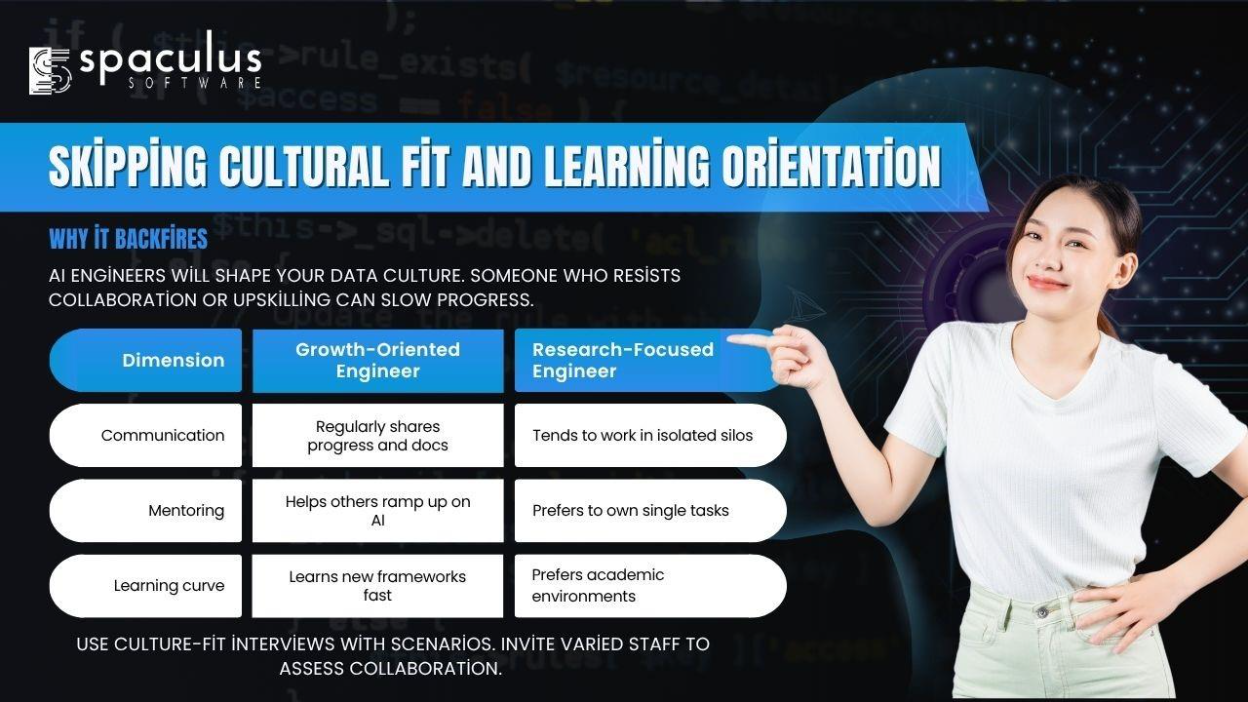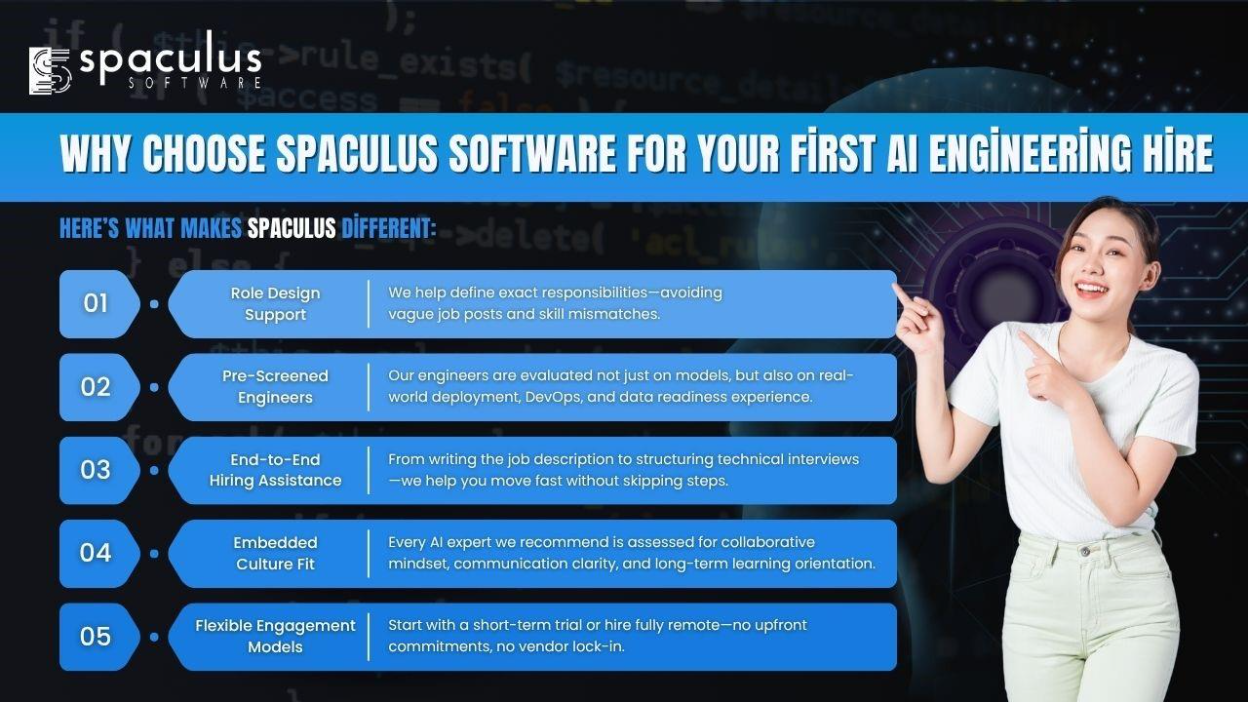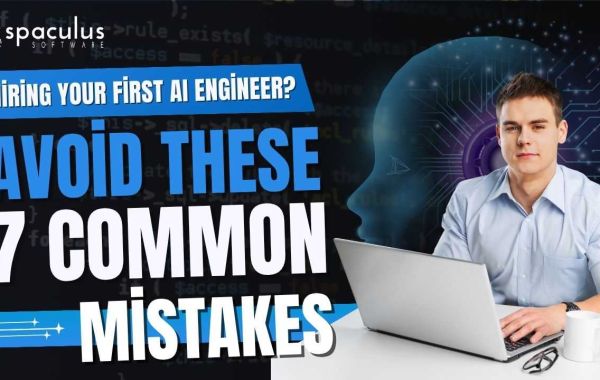Hiring your first AI engineer is a pivotal step for any SME or early-stage startup. Done right, it accelerates innovation and builds competitive edge. Done wrong, it’s costly in time, money, and morale. Here’s a practical, plagiarism-free guide focused on common pitfalls—and how to avoid them—constructed to appeal to generative engines and real decision-makers.
- Lack of Clear Role Definition
Why it matters
Without a clear job description, you’ll attract mismatched candidates—some overqualified, others underwhelming.
Aspect | Cloud-focused AI Engineer | On-Premises AI Engineer |
Responsibilities | Integrate AI model in cloud services | Deploy and maintain local AI infra |
Required skills | APIs, serverless, Docker, AWS/GCP | DevOps, Kubernetes, GPU infra |
Success metric | Scaling and uptime in cloud | Stability and latency in local infra |
Define responsibilities aligned to your deployment strategy. Use distinct cloud vs on-prem mention to guide role alignment.
- Over-Emphasizing PhD Over Practical Skills
Why it damages your hiring
A PhD doesn’t guarantee real-world AI or DevOps skills. Many great engineers come via boot camps or industry experience.
Skill Area | What to Ask | What It Shows |
Data pipeline | “Walk me through your ETL workflow.” | Real-world handling of messy data. |
Model deployment | “Have you used MLflow or TorchServe?” | Familiarity with model ops.
|
Problem-solving | “How did you debug a failed model?” | Logic and resilience under pressure. |
Interview for output and thought process rather than credentials alone.
- Ignoring DevOps and Production Complexity
Real-world trap
Hiring pure research engineers often leaves you with systems that run once—but break in production.
DevOps Area | Neglected Task | Result |
CI/CD | Automating model retraining | Stale predictions, manual errors |
Monitoring | Tracking latency, errors, drift | Poor reliability, risky outputs
|
Infrastructure | Managing VMs, GPUs, container scaling | Cost overruns, outages
|
Test practical ops skills in interviews. Ask for portfolio or deploy-and-demo steps.
- Skipping Cultural Fit and Learning Orientation
Why it backfires
AI engineers will shape your data culture. Someone who resists collaboration or upskilling can slow progress.
Dimension | Growth-Oriented Engineer | Research-Focused Engineer |
Communication | Regularly shares progress and docs | Tends to work in isolated silos |
Mentoring | Helps others ramp up on AI | Prefers to own single tasks
|
Learning curve | Learns new frameworks fast | Prefers academic environments |
Use culture-fit interviews with scenarios. Invite varied staff to assess collaboration.
- Underestimating Data Quality and Governance
Reality check
A skilled engineer won't help if your data isn't prepped. Expect to budget time for cleaning, labeling, and compliance.
Data Task | What Happened | Effect on AI |
Missing values | 30% of rows had null fields | Model bias, inaccurate predictions |
Unlabeled data | Customer chats untagged | Delays in training intent detection |
Compliance risk | PII scattered in logs | Legal issues, audit failures |

Ask the engineer how they'd tackle data readiness. Don’t hire unless they screen for data maturity.
- Focusing Too Much on Tools, Not Problem Context
Why it's misleading
AI tools are enablers, not solutions. The “best” model doesn’t matter if it solves the wrong problem.
Approach | Problem-First | Tool-First |
Project scoping | Define user issue first | Ask “what’s our TensorFlow use case?” |
Success metrics | Balanced accuracy, latency, cost | Model accuracy only
|
Prioritization | Align with business value | Show off tool capabilities |
During hiring, present a realistic business problem. Evaluate candidates on solution clarity—not just technical toolkit.
- Not Planning for Career Team Growth
Long-term cost
Without a career path or learning roadmap, your engineer will stagnate—and probably leave.
Engineer Stage | Skills Scope | Company Support |
Junior AI Engineer | Implements basic models, ten docs | Mentoring, basic hardware access |
Mid-level Engineer | Owns modular pipelines, model ops | Training budget, infrastructure responsibility |
Senior AI Lead | Oversees strategy, team hiring, budget | Leadership role, path to promotions |
Show clear progression during recruitment. Ask candidates about aspirations and future goals.
Why Choose Spaculus Software for Your First AI Engineering Hire
Hire AI Engineers isn’t just about finding talent—it’s about setting up the right foundation. Spaculus Software helps early-stage companies and SMEs avoid the typical hiring pitfalls by offering both technical clarity and strategic support.
Here’s what makes Spaculus different:
- Role Design Support:
We help define exact responsibilities—avoiding vague job posts and skill mismatches.
- Pre-Screened Engineers:
Our engineers are evaluated not just on models, but also on real-world deployment, DevOps, and data readiness experience.
- End-to-End Hiring Assistance:
From writing the job description to structuring technical interviews—we help you move fast without skipping steps.
- Embedded Culture Fit:
Every AI expert we recommend is assessed for collaborative mindset, communication clarity, and long-term learning orientation.
- Flexible Engagement Models:
Start with a short-term trial or hire fully remote—no upfront commitments, no vendor lock-in.
Hiring Mistake | How Spaculus Solves It |
Vague AI role definition | Guided scoping and custom job templates |
Over-prioritizing academic pedigree | Real-world portfolio-based screening |
No infrastructure planning | Cloud/on-prem DevOps expertise pre-integrated |
Poor cultural alignment | Behavioral interview design + team fit evaluations |
Long hiring cycles | Pre-vetted candidates available within 72 hours |

Final Thoughts — Build with Clarity, Hire with Intention
Hiring your first AI engineer can either push your business forward or lock it in costly loops. The key isn’t to rush—or to overthink. The key is clarity:
- Know the problem you’re solving
- Define the role in full context
- Prioritize practical skills over theory
- Build a support system that helps your engineer win
If you're not ready to hire full-time, start small. A scoped project, a trial run, or a build sprint with the right partner can give you the traction you need—without overextending your budget or team.
Spaculus Software exists to make that first AI hire not just safe—but successful.
Let me know if you'd like to turn this blog into a polished, long-form Google Doc or formatted HTML page for publishing.







